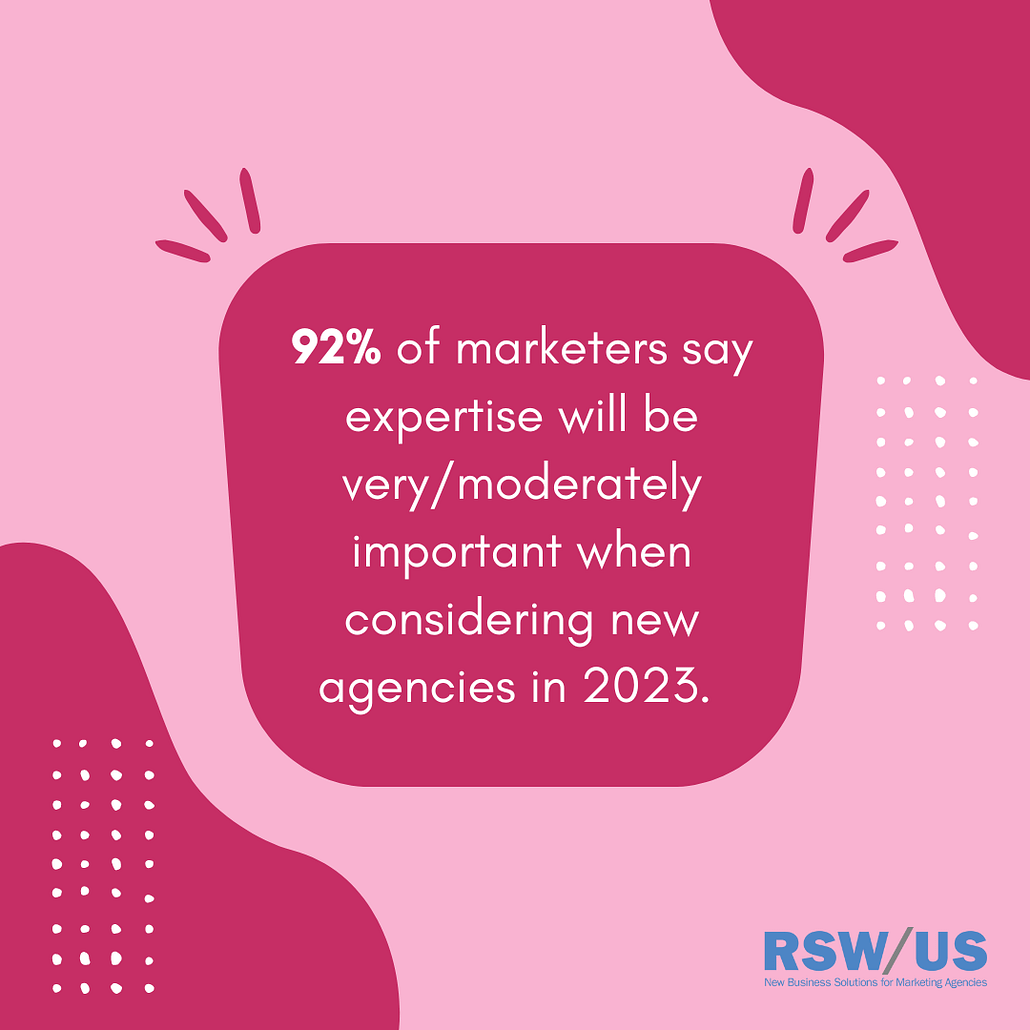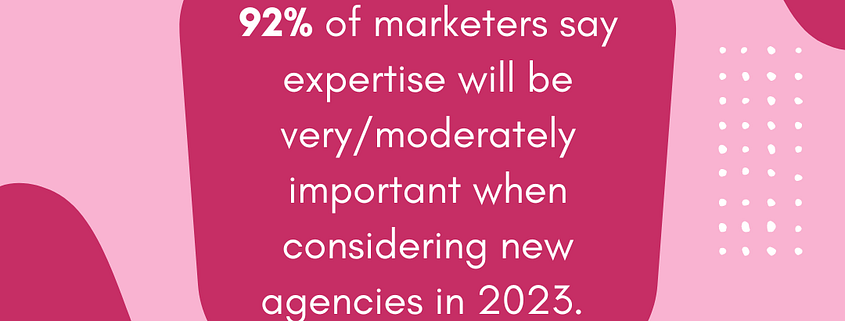Why Should Ad Agencies Specialize?
Ad agencies specialize because it establishes the agency as an expert in a given vertical, or verticals. 92% of marketers say expertise will be very/moderately important when considering new agencies. Specialization also helps establish a strong agency brand, and aids business development efforts by making it easier to find new, desirable clients.
Stats below are taken from our 2023 RSW New Year Outlook Report (download here at no cost).
Why Should Ad Agencies Specialize: Specialization Myths
(I don’t know that “myths” succinctly applies here, “misconceptions” is probably the better word, but myths fits into a subject line better than misconceptions.)
It’s often groan-inducing when an agency hears “you need to specialize in order to get the clients you really want”.
We’ve certainly talked about it before (right here actually: Don’t Be Scared Of Specialization.)
But any groaning aside it is important:
92% of marketers say expertise will be very/moderately important when considering new agencies in 2023.

Horizontal and Vertical Positioning Definitions
Before we get to the myth, if you will, it’s important to establish the forms that specialization, and your resulting positioning, can take.
And to do that, I’ll refer to David C. Baker, who wrote an insightful post on the subject for us a few years back and still holds up quite well.
From David’s Pros And Cons Of Positioning Your Firm Vertically Or Horizontally:
A vertical positioning is centered around an industry category, such as NAICS 541430–Graphic Design Services.
Or it could be very broad, like marketing for manufacturing, but it’s usually narrower than that.
So it might be credit unions, specialty physicians, non-profits, or high-growth tech.
A horizontal positioning defines your target in another way by spanning most of the verticals.
You could define your horizontal by a demographic segment, like millennials, Hispanics, women, or even around employee alignment.
It could be as specific as helping B2B leaders at disruptive transitions. You could also define it by a practice area, like investor relations.
The Ad Agency Specialization Myth
So let’s get to the main myth, if you will, about specialization: specialization doesn’t mean you have to focus on just one vertical.
David’s initial definition begins that explanation.
Agencies, understandably, don’t always take the time to think through the nuances of positioning, and what specialization could look like in reality for their agency.
If you’re struggling with this, I suggest reading David’s entire post, but here’s further, helpful explanation from it:
The most powerful positioning combines both, in something like a crosshairs, but you always lead with a horizontal or a vertical focus.
So you might target credit unions but with a particular focus on social media.
That would be a vertical positioning, primarily, but with a bold narrowing on top of it.
Or you might be a public relations firm specializing in investor relations with a particular strength in tech.
That would be a horizontal positioning, primarily.
Ultimately, it’s important for you to remember, your prospects are looking for expertise, and a certain level of specialization, but it doesn’t mean you have to paint your agency into a rigid corner.
Another related stat from our report:
72% of marketers say an agency’s site is important/very important in helping determine whether they’ll entertain an initial meeting.

Ad Agency Specialization-Make It Clear On Your Site
A final note on specialization: if you do the work to craft your positioning and specialization, it can’t end there.
And that may sound glaringly obvious, but too often agencies nail the positioning down, but leave out an important step-updating their site to reflect it.
In one of our new questions in our new year outlook survey, we asked marketers, “How important is an agency’s website in helping you determine whether you’ll entertain a conversation with an agency?”
The agency site is typically the first thing a prospect sees, right?
But how important to your prospects is it really?
As our stat above points out, it’s important.
This is probably not a great shock to agencies, but it should be something of a wake-up call, or at the very least a reminder.
Your agency’s site is a visual elevator pitch, yet many agencies don’t consider this when creating or updating their sites.
Your site is typically the last thing you get to because it takes time to update it, but here’s further proof you must attend to it.
Even if that means an initial copy update to reflect your updated positioning, and/or updates over time.
To help drive more new business for your firm, look at it as soon as you can and make a plan for those updates.
And if you need help, that’s what we do. Contact us here.


